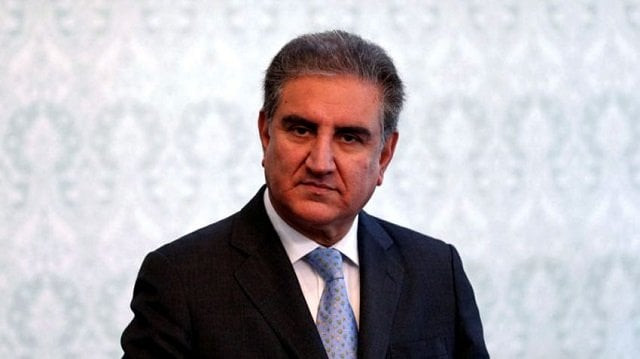Sino-Indian confrontations due to New Delhi’s Hindutva thinking: FM Qureshi
Hindutva agenda of New Delhi will destroy peace in the region, says foreign minister

PHOTO: RADIO PAKISTAN/FILE
The foreign minister added the Hindutva agenda of New Delhi will destroy peace in the region.
"India's stubbornness led to a skirmish on May 9, but it has now turned into a bloody confrontation," FM Qureshi said. "If India keeps this Hindutva bigotry up, the situation will get worse."
The foreign minister cited reports of the June 15 violent clashes between the nuclear-armed states at the LAC which resulted in at least 20 Indian troops being killed.
The FM asserted that the Chinese government had tried to resolve the territorial issue through dialogue but India continued construction in the disputed area.
"China's position is principled," Qureshi said. "Tibet and Ladakh's 3,500 km area is a disputed border area between India and China and if India thinks that it will just take the area, then it may not be acceptable to China."
The FM further said that Pakistan has rejected the unilateral move taken by India on August 5 and China has also objected.
"India is pursuing a mindset of fanaticism rather than rationality," he said. "The attitude they have towards their minorities in their country is obvious to all. Pakistan is a peace-loving country. We want peace and stability in the region."
Pakistan's efforts for peace in Afghanistan are in front of the whole world, FM further added.
"If India thinks it will be intimidated by its aggressive behaviour, then it is their misunderstanding," the FM asserted.
He further added that Pakistan had offered to resolve the issue through dialogue with India, which was rejected by the Indian government.
"You saw that in February and Pakistan gave a full response," he added.
The Indian army said on Tuesday that 20 of its soldiers were killed in clashes with Chinese troops at a disputed border site, in a major escalation of a weeks-long standoff in the western Himalayas.
On Saturday, top Chinese and Indian military officials held high-level talks on to resolve the latest border standoff between the two nuclear-armed neighbours.
The talks were held at the Maldo border outpost on the Chinese side of the LAC, the de facto border between the two countries.
According to the Indian military, Lt Gen. Harinder Singh, commander of India’s 14 Corps, led New Delhi’s delegation, while the Chinese team was led by Major Gen Liu Lin, commander of the South Xinjiang Military Region.
Border skirmishes between the two sides started on May 5 at the Galwan valley in Ladakh, followed by Nakula pass in India’s northeastern Sikkim region three days later.
China claims territory in India’s northeast, while New Delhi accuses Beijing of occupying its territory in the Aksai Chin plateau in the Himalayas, including part of the Ladakh region.
The two countries even fought a war over the hilly state of Arunachal Pradesh in 1962, called the Sino-Indian War.
In 2017, the two armies were locked in a 73-day standoff in the disputed Doklam plateau near Sikkim, over the construction of a road by the Chinese.
The Asian giants have rival claims to vast swathes of territory along their 3,500 km (2,173 mile) Himalayan border, but the disputes have remained largely peaceful since a border war in 1962.



















COMMENTS
Comments are moderated and generally will be posted if they are on-topic and not abusive.
For more information, please see our Comments FAQ